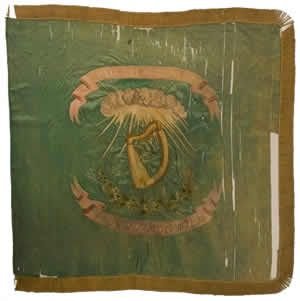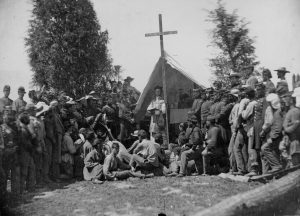Weekly Whitman: Old Ireland

Written in 1861, this poem makes special mention of the Union volunteers who lived in New York City. The Irish Diaspora had been bringing the Irish to the shores of America since the 1840s. The Civil War, twenty years later, made no dent in the number of immigrants arriving with each international ship. Irishmen signed up to serve the Union in droves in ’60-61.
Old Ireland
Far hence, amid an isle of wondrous beauty,
Crouching over a grave, an ancient sorrowful mo-
ther,
Once a queen—now lean and tattered, seated on the
ground,
Her old white hair drooping dishevel’d round her
head;
At her feet fallen an unused royal harp,
Long silent—she too long silent—mourning her
shrouded hope and heir;
Of all the earth her heart most full of sorrow, be-
cause most full of love.
Yet a word, ancient mother;
You need crouch there no longer on the cold ground;
Oh! you need not sit there, veil’d in your old white
hair, so dishevel’d,
For know you the one you mourn is not in that
grave,
It was an illusion—the heir, the son you love, was not
really dead;
The Lord is not dead—he is risen again, young and
strong, in another country;
Even while you, veiled, wept there by your fallen
harp, by the grave,
What you wept for was translated, pass’d from the
grave,
The winds favor’d and the sea sail’d it,
And now with rosy and new blood, again among the
nations of the earth,
Moves to-day, an armed man, in a new country.


The 1840s represented hardship for the Irish, but also the revival of Gaelic traditions and Irish Nationalism in Southern Ireland that brought changes to British Parliament and Democratic impulses to the United States. In this sense, the poet is communicating that Ireland is reborn.
So well said. Thank you.
That is one of my favorite Whitman poems, one among many. It always makes me tear up. I can see that aged mother, her harp on the ground, at the grave of her fallen child. Whitman was a master of using words to create emotion. Thanks, Meg, for this series.
My pleasure. I am enjoying doing it very much.